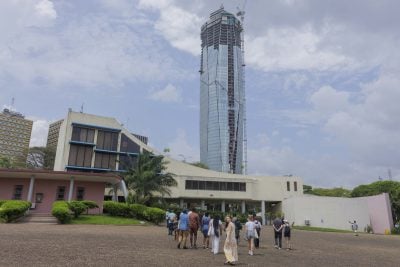He identified these as including urban planning and development, to absorb Africa’s rapid urbanisation, eGovernment, oil and gas, transport and logistics, manufacturing, special economic zones, technical and vocational training, power, water and affordable housing.
These are precisely the areas that African countries must tackle if the current economic growth is going to be translated into the transformation that the continent’s populations have every right to expect.
The intervention of companies such as Surbana, Crimson Logic (eGovernment) and Portek is already playing a significant transformative role in some African countries. Given the fact that these Singaporean companies are considered some of the best in the world and experts in emerging markets, one would have expected that African governments would have been hammering at their doors contracts in hand.
Stream turning into a flood
This has not happened yet, but is on its way as the word gets out. Nigeria’s High Commissioner to Singapore, HE Nonye Rajis-Okpara, says that the current stream of economic activity between Singapore and Africa could rapidly turn into a flood in the near future. “As you know, there is an information gap on both sides at the moment but it is being filled in. The Forums are a very good starting point and as more Africans learn about what Singapore can do for them, and vice versa, you will see a very rapid increase in bilateral economic relations.”
Nigeria, now officially the largest economy in Africa, has wasted no time signing a whole sheaf of contracts and MOUs with Singaporean organisations, including IE Singapore.
Given the importance that Singapore places on consistently expanding trade and developing new markets, IE Singapore is always on the lookout for the brightest graduates it can lay its hands on to join the organisation
“Asia is enjoying a period of upward growth and remains one of the bright spots amid the current global landscape,” says Jayakrishnan. “To tap into this growth, we welcome African companies to partner Singaporean companies, leverage Singapore’s position and connectivity to expand into the region.”
But while organisations such as IE Singapore, the Africa Business Group, the Ministry of Trade and the private sector involved in Africa can beat the drum for the continent, persuading the medium-sized companies to actually take the plunge can be much more of a challenge. “There has been quite a dramatic increase in the number of business delegations going to various African countries,” says Ghosh, “and various African countries are doing a good job in selling themselves, but the realities on the ground can come as a bit of a shock to Singaporeans.”
He points to the often underdeveloped state of the basic infrastructure in most of Africa, the bureaucracy, slowness and inefficiency associated with most state activities, the congested ports and poor transport infrastructure that make logistics in Africa the most expensive in the world, the endemic corruption as the major constraint on greater volumes of Singaporean investment.
Ian Lee, director of IE Singapore’s centre in Accra, says the problems begin even before a potential investor has set foot in an African country. “The problem we often have is that when the investor comes, he cannot get in the country. We are working very hard to facilitate these kinds of visa waivers, but there are still problems. If the investor cannot go into the country, how can the money go in?” he asks with impeccable logic.
Is this another case of a government’s left hand destroying all the good work that the right hand is doing?
“There is often also a lack of transparency in the affairs of many companies that Singaporeans would like to partner with,” adds Ghosh. “This is a major disincentive,” he adds. Some potential investors told me that what is holding them back is the almost total lack of reliable statistics and current information on various African countries. They are also worried about the legal system and the independence of courts.
“However,” Ghosh concludes, “You can look at the situation from different angles – all the challenges that Africa throws up are also opportunities for Singaporean companies to help put right. We did this in our own country and are doing so in emerging markets which throw up the same challenges as most of Africa.”
Indeed, it is all a matter of perspective and the view of Africa from Singapore is brightening all the time.
Want to continue reading? Subscribe today.
You've read all your free articles for this month! Subscribe now to enjoy full access to our content.
Digital Monthly
£8.00 / month
Receive full unlimited access to our articles, opinions, podcasts and more.
Digital Yearly
£70.00 / year
Our best value offer - save £26 and gain access to all of our digital content for an entire year!
 Sign in with Google
Sign in with Google 


